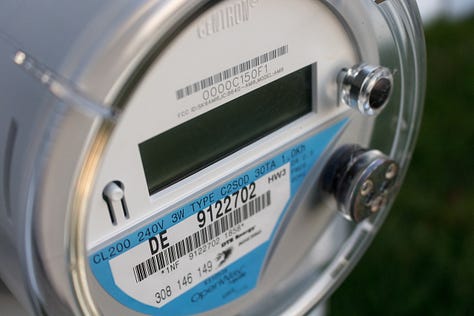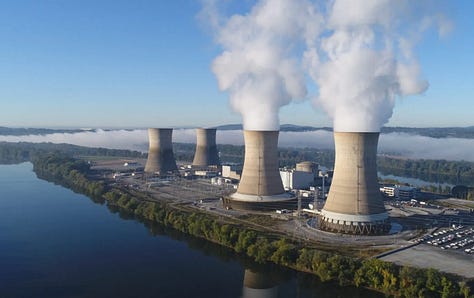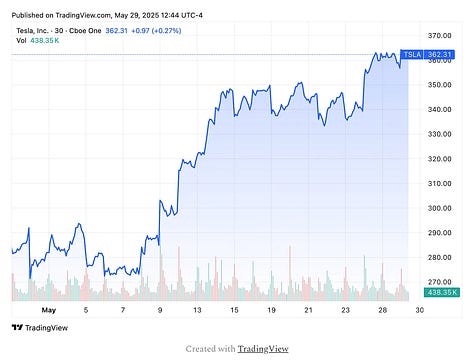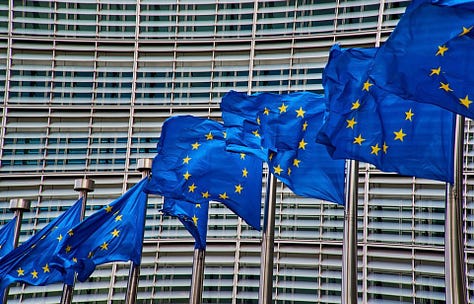Green Lights May 30: Top stories this week
Don't miss a single story from the best of Callaway Climate Insights.






. . . . Welcome back to Green Lights. Here’s our roundup of the best of Callaway Climate Insights. This week, David Callaway considers Elon Musk’s next move — again. Plus, he meets up with some tech entrepreneurs with new ideas. Mark Hulbert tackles the thorny issue of AI energy consumption. We hope you have a great start to your summer. Please subscribe to support our climate finance journalism.
. . . . Now that Elon Musk is officially slinking out of Washington and back to the media safety of the tech world from which he came, attention is quickly diverting to his next act — Tesla’s driverless robotaxis. David Callaway writes that investors aren’t waiting to find out how that goes: Shares are up about 30% in the past month, though still down about 10% year-to-date after Musk’s brand-crushing performance at DOGE earlier this spring. Do robotaxis really herald a new era for the EV maker?
. . . . Think twice the next time you ask AI to summarize that email you just received from Callaway Climate Insights. Few of AI’s most exuberant supporters are aware of just how much electricity and water it takes to power the usage of a product such as ChatGPT for just one frivolous question, writes Mark Hulbert. An inquisitive professor at the University of California ran the math and figured for just one question you’re wasting the equivalent of the entire water bottle on your desk. Imagine how much is used to bring AI systems to the level that consumers desire? Hulbert argues that the energy demands and demands for water to cool the AI data centers are being lost in the mad rush for more AI.
. . . . A slowly evolving acceptance of nuclear energy back into the renewable fold over the past few years has picked up pace as energy demand for data centers adds to the urgency of creating new sources in the U.S. and Europe. Executive orders from President Donald Trump fueled nuclear stocks earlier this week as the White House seeks to rapidly improve the time to market for restarting existing nuclear plants such as Three Mile Island (above) and approving new technology such as small modular reactors.
. . . . A tough year for climate hawks in the European Union, including approval last week to delay implementation of the block’s carbon border tax by one year, was somewhat offset this week by an internal report that said by and large, the EU is still on track to reach the climate goals for 2030 that it set five years ago.
. . . . Silicon Valley isn’t the only nursery for tech startups. San Francisco Bay Area entrepreneur Zachary Kushel aims to bring new groups of people and ideas to the fore. Kushel started Marin Sonoma Impact Ventures a few years back and it has quickly become the hive for founders in the North Bay looking to network, raise money and meet each other.
. . . . Forests around the world disappeared last year at a rate of 18 soccer fields every minute, a global survey found. Fires accounted for nearly half of the losses, The New York Times reported in its review of annual research on the state of the world’s forests. According to the report, for the first time since record-keeping began, fires, not agriculture, were the leading cause of rainforest loss, accounting for nearly half of all destruction. Those fires emitted 4.1 gigatons of greenhouse gasses — more than four times the emissions from air travel in 2023.
More greenery . . . .
Is climate change to blame?” Collapsing glacier destroys a Swiss village (USA Today)
Or is oil to blame?: Big Oil faces first-ever climate change wrongful death lawsuit (Quartz)
A long, hot summer: Billions of people are enduring an extra month of extreme heat (AP)
Check the cellar: European wines most at risk from climate change (Beverage Daily)
Insurance to food shocks: Here are the 10 best ‘Eye on the storm’ reports (Yale Climate Connections)







